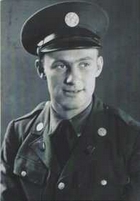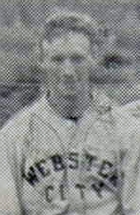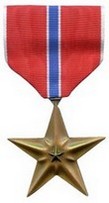Don Shelton
| Date and Place of Birth: | June 11, 1918 near Webster City, IA |
| Date and Place of Death: | September 15, 1944 near Terenza, Italy |
| Baseball Experience: | Minor League |
| Position: | Pitcher |
| Rank: | Staff Sergeant |
| Military Unit: | Company E, 133rd Infantry Regiment, 34th Infantry Division US Army |
| Area Served: | Mediterranean Theater of Operations |
Don was a fine young man who attended church and Sunday
school at the Church of Christ. He was greatly devoted to his mother and
father and long will be remembered as an outstanding sportsman and a
true friend.
Webster City Observer November 19, 1948
Donald R. Shelton was born on a farm in north
central Iowa. The only son of Ray and Pearl Shelton, he was eight years
old when the family moved to Webster City along the Boone River in Iowa.
A big, raw-boned young man, he was an outstanding threesport athlete at
Lincoln High School and captained the basketball team his senior year,
receiving all-state honors as a center. He was also named to the
all-conference team in football and received honorable mention as a
pitcher.
During his senior year in 1937, Shelton was invited by the Pittsburgh
Pirates to throw to their batters in a pre-game practice in Des
Moines.[1] He was not signed by the major league club, however, and
pitched during the summer for the local Clave Feeders team as well as
the semi-pro club of Williams, Iowa. In the spring of 1938, Shelton had
a tryout with the Clinton Owls of the Class B Three-I League at their
Greensboro, North Carolina, spring training camp but failed to make the
grade and returned to the semi-pro circuit. Shelton pitched for the
Goldfield Indians in 1939 and was back for a trial in the minors in
1940, making a couple of appearances for the St. Joseph Autos of the
Class C Michigan State League and then the Hopkinsville Hoppers of the
Class D Kitty League.
In December 1940, Shelton enlisted with Company E of the Iowa National
Guard. The company was mobilized on February 27, 1941, and Shelton
trained at Camp Claiborne, Louisiana, and Fort Dix in New Jersey. In
February 1942, he was with the 34th "Red Bull" Infantry Division bound
for Northern Ireland, the first U.S. infantry division to serve in the
European Theater. While he was stationed at Castlerock, near Coleraine,
informal baseball games between battalions began almost as soon as the
troops set up camp. On July 4, 1942, to celebrate Independence Day, the
first officially recognized baseball game in Northern Ireland since the
First World War took place at Windsor Field, a soccer stadium in
Belfast. Shelton was a relief pitcher for the Midwest Giants
representing the 34th Infantry Division against the Kentucky Wildcats
who represented the 1st Armored Division. In front of an enthusiastic if
somewhat bewildered crowd of locals, Shelton hurled shutout ball the
last three innings to preserve a 3-2 win for the Midwest Giants.[2]
Ball games continued throughout the summer months but gave way to
intensive training as the division prepared to take part in Operation
Torch, the Allied landings at North Africa. On January 3, 1943, the
division faced little opposition from the Vichy French troops during
landings at Oran in Algeria, and moved up to the front line in Tunisia
the first week in February. Staff Sergeant Shelton remained in the front
line until the end of the Tunisian campaign in May 1943. The 34th
Infantry Division then returned to Oran, where Shelton played on a
championship basketball team and participated in a number of swimming
competitions. The division baseball team also played two games - both
against the 95th General Hospital - losing the first game, 11-0, and
winning the second, 11-0. It was the last time Shelton played baseball.
The invasion of Italy began in September 1943, and Shelton distinguished
himself as a combat infantryman during this time, receiving the bronze
star "for exemplary conduct in ground combat against the armed enemy on
or about March 25, 1944."[3]
He was wounded in the bitter fighting around Lanuvio in early June 1944,
and was sent to an Army hospital. While recuperating he had the
opportunity to visit the historic city of Rome and also participated in
an Army swimming competition before returning to his unit. The Allied
advance through Italy was a slow, grueling and costly process. In
September 1944, the division was slowly advancing against stiff German
opposition in northeast Italy. On September 15, Company E attacked
German forces near Terenza in Tuscany. Shelton was killed that day. His
parents, who were then living in California, where Ray Shelton had found
employment with the Santa Fe Railroad Company, received the shocking
news of their son's death two weeks later.
Don Shelton was originally buried in Italy. On November 22, 1948, his
body was returned to Webster City, Iowa. Military services were held at
Foster's Funeral Home and he was buried at Graceland Cemetery. "Don was
a fine young man," stated the Webster City Observer in November 1948,
"He was greatly devoted to his mother and father and long will be
remembered as an outstanding sportsman and a true friend."[4]
|
Year |
Team |
League |
Class |
G |
IP |
ER |
BB |
SO |
W |
L |
ERA |
| 1940 | St. Joseph | Michigan State | C | - | - | - | - | - | - | - | - |
| 1940 | Hopkinsville | Kitty | D | - | - | - | - | - | - | - | - |
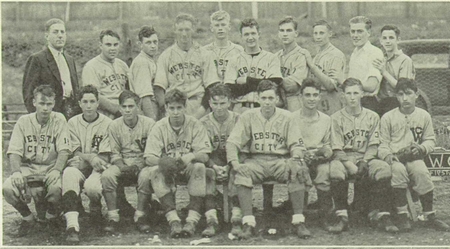
Don Shelton (back row, fourth from left) with the
Lincoln High School baseball team in 1938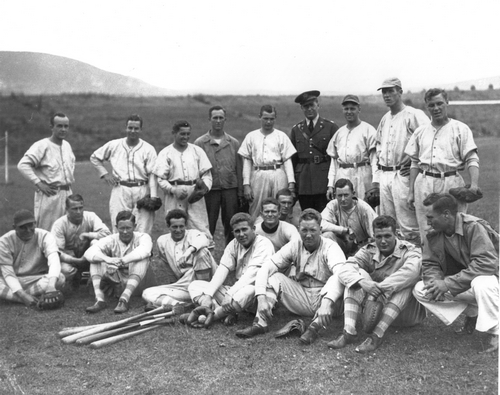
34th Infantry Division "Midwest Giants" in
Northern Ireland in 1942
(Don Shelton is front row, seventh from left, with just his head visible)
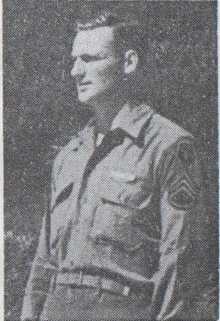
Notes
1. Mason City Globe-Gazette, April 19, 1937
2. Stars and Stripes (London Edition), July 11, 1942
3. Webster City Observer, November 19, 1948
4. Webster City Observer, November 19, 1948
Thanks to Ketta Lubberstedt at the Kendall Young Library in Webster City and Gus Dermand, former mayor of Webster City, Iowa, for help with this biography. Some of the military information was obtained from the 34th Infantry Division Association. Thanks also to Astrid van Erp, for help with photos for this biography.
Date Added February 25, 2012 Updated July 30, 2017
Baseball's Greatest Sacrifice is associated with Baseball Almanac
Baseball's Greatest Sacrifice is proud to be sponsored by

